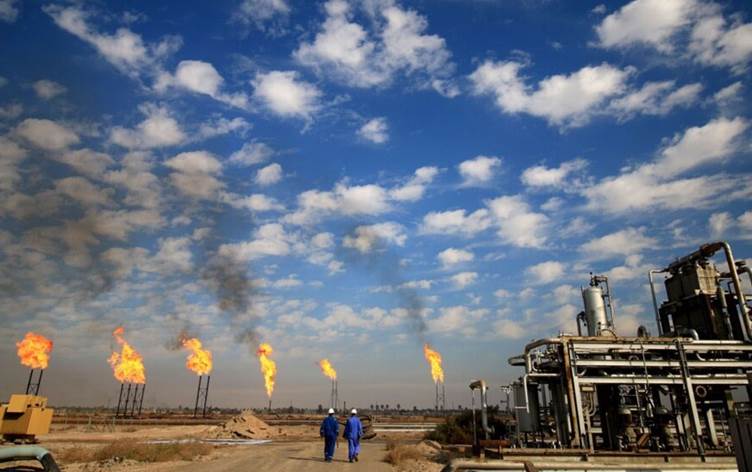ERBIL, Kurdistan Region - The resumption of oil exports through the Iraq-Turkey pipeline will resume once outstanding issues between the Iraqi federal government and the Kurdistan Regional Government on the mechanism of the exports are resumed, an Iraqi MP told Rudaw on Monday.
Oil exports from the Kurdistan Region through the Iraq-Turkey pipeline have been halted since March 23, 2023 after a Paris-based arbitration court ruled in favor of Baghdad against Ankara, saying the latter had breached a 1973 agreement by allowing Erbil to begin independent oil exports in 2014.
The Iraqi oil ministry on Monday blamed the international oil companies (IOCs) working in the Kurdistan Region for not reopening the pipeline, stressing that halting the process was not the decision of Baghdad and that the federal government is “the most affected” by the halt in exports.
The ministry was responding to a statement by an IOC association in the Kurdistan Region, and labeled the statement a “blatant interference” in Iraqi affairs.
“After the issues are resolved between the Kurdistan Regional Government and the [Iraqi] oil ministry, there will be normal exports because they will issue an order for the oil companies to extract oil again,” Ali Abdulsattar, a member of the Iraqi parliament’s oil and gas committee, told Rudaw’s Dildar Harki.
Abdulsattar said that the issues mainly revolve around the mechanism of the contracts between Erbil and the IOCs.
“The contracts with the oil companies are production sharing companies [PSCs] and are different from the service contracts that exist with oilfields under the authority of the federal government,” he said.
The IOCs and the KRG are bound by Production Sharing Contracts (PSCs). Under the Kurdistan Region’s PSC model, the IOCs cover the entire cost of production while the KRG receives the lion’s share of the profits from successful projects.
The lawmaker believes the responsibility for the oil exports remaining halted over a year since the Paris-based arbitration court ruling is shared among all sides, refusing to accuse a specific side for the exports not being restarted.
“I think the federal government and the oil ministry is serious in resolving these issues, and soon we will see them resolved and oil exported through the Ceyhan port again,” he stressed.
The Association of the Petroleum Industry of Kurdistan (APIKUR) on Saturday claimed that the Iraqi federal government has not taken the required actions to reopen the pipeline, adding that there has been no real progress in resuming the exports a year after the process was put on hold.
In response to the APIKUR statement, Iraq’s oil ministry blamed “the refusal of the foreign companies working in the Kurdistan Region to officially hand over their production to the Regional Government to be exported in accordance with the in-force federal budget law” for the exports still remaining halted.
The statement added that the Iraqi federal budget obliges the Kurdistan Region to hand over its oil production to Baghdad to be exported, noting that there are reports from OPEC and “reliable international secondary sources” that confirm there are around 200 to 225 thousand barrels of oil produced on a daily basis in the Kurdistan Region “without the knowledge or approval” of the oil ministry.
Article 13 of the Iraqi federal budget obliges the Kurdistan Region to hand over, on a daily basis, at least 400,000 barrels of crude oil to Iraq’s State Oil Marketing Organization (SOMO) to be exported through Turkey’s Ceyhan port, or be used domestically in case it is not exported.
Furat al-Musawi, an energy expert, told Rudaw’s Mohammed Sheikh Fatih on Monday that the halt in exports has caused “significant material and economic damages” to Iraq’s economy, stressing that “there is no winner in this case.”
“These companies [IOCs] want their financial expectations before resuming oil exports. They also want guarantees from the federal government for oil exports not to be halted again,” Musawi said.
The expert cited technical difficulties as a key reason for the difficulty in resolving differences, with the IOCs asking for a much higher extraction fee of $21 per barrel as opposed to the amount set in Iraq’s federal budget law - at $6.
“These technical issues have not been resolved with the oil companies in the Kurdistan Region. These oil companies are not the only ones responsible for the exports having yet to be restarted,” Musawi stressed.
APIKUR spokesperson Myles Caggins told Rudaw English in August that the inability to reach a satisfactory agreement regarding payment would leave oil firms with no alternative but to file a complaint at an arbitration court in London.
The Iraqi federal government has previously called for resuming the Kurdish oil exports and met with representatives of the Kurdistan Region IOCs in hopes of compromising on “acceptable legal solutions” but the foreign companies have not been flexible to change their stance, the Iraqi oil ministry statement said.
The closure prevents the export of 450,000 barrels of crude oil per day from the Kurdistan Region, costing Baghdad and Erbil billions of dollars in losses.









Comments
Rudaw moderates all comments submitted on our website. We welcome comments which are relevant to the article and encourage further discussion about the issues that matter to you. We also welcome constructive criticism about Rudaw.
To be approved for publication, however, your comments must meet our community guidelines.
We will not tolerate the following: profanity, threats, personal attacks, vulgarity, abuse (such as sexism, racism, homophobia or xenophobia), or commercial or personal promotion.
Comments that do not meet our guidelines will be rejected. Comments are not edited – they are either approved or rejected.
Post a comment